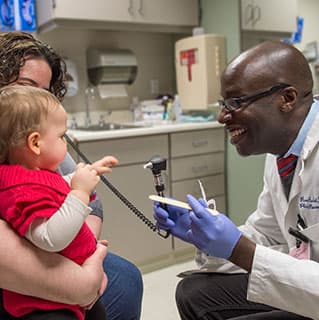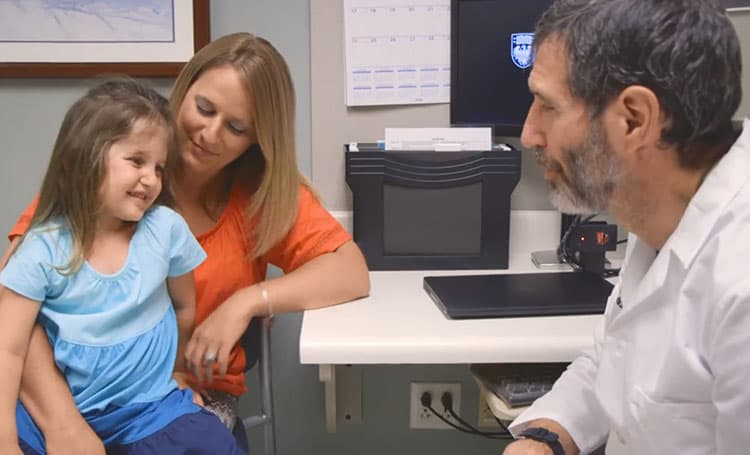Pediatric Craniosynostosis
The Craniofacial Anomalies Multidisciplinary Program (CAMP) at the University of Chicago Medicine Comer Children's Hospital is one of the largest craniofacial programs in the region. Our renowned craniofacial surgeons specialize in the treatment of craniosynostosis.
Craniosynostosis refers to a type of birth defect that involves the premature fusion, or closure, of one or more “seams” on a baby’s skull. These seams, which are called sutures, connect individual skull bones. Trigonocephaly is a fusion of the forehead suture and is one form of craniosynostosis.
When these sutures are open, they allow the skull to expand evenly when the brain grows during infancy. When a suture has closed too early, the skull cannot expand in a uniform fashion. In some cases, this may lead to increased pressure on the brain. This is called elevated intracranial pressure, which can produce signs and symptoms such as headaches, irritability, visual changes and developmental delays. Elevated intracranial pressure occurs approximately 13 percent of the time when a single suture is affected and up to 42 percent of the time when multiple sutures have fused early.
How is Craniosynostosis Diagnosed?
Craniosynostosis is usually diagnosed by a specialist who is experienced in examining a child’s head shape, such as a pediatric neurosurgeon or pediatric plastic surgeon. Special X-ray tests such as computerized tomography (CT) scans can be used to confirm the diagnosis by revealing the fused suture.
Proper diagnosis is important because craniosynostosis should not be confused with plagiocephaly, a term that refers to a crooked head shape without a fused suture. This distinction is critical because craniosynostosis is usually treated with surgery, while plagiocephaly is treated with nonsurgical therapy.
How is Craniosynostosis Treated?
If surgery is recommended for your child, our specialists will present a detailed discussion of the treatment options with you. Typically, surgery is performed in infancy (at three to nine months of age), depending upon the technique. Our priority is to perform surgery when it is safest for your child and to minimize surgical and post-surgical risks.
Surgical Procedures
This surgery involves removing the affected suture as a strip and making special cuts on the bones of the skull to allow the skull to reshape itself. The surgery may involve a bicoronal (ear-to-ear) incision or an endoscopic technique, which is performed through a limited incision. The advantage of a modified strip craniectomy is that it requires less time than other techniques, such as the calvarial vault reshaping technique. This means patients have less bleeding and a shorter hospital stay. The disadvantage is that the modified strip craniectomy may only be effective for certain types of craniosynostosis, such as the sagittal type (front-to-back suture), and may require more extensive surgery later. For this operation to be effective, the surgery should be performed no later than three months of age. After surgery, patients must wear a helmet for several months to help mold the head.
This technique involves temporarily removing the skull bones (called a craniotomy), reshaping them and replacing them to form the skull in their new shape and arrangement. The reshaped bones are secured using synthetic plates and dissolving screws. A clear advantage of this versatile reconstruction is that it allows the surgeon to precisely reshape an area of, or the entire, skull. Also, the bones are reshaped in one surgery, and no helmet is required after surgery. The disadvantage of this approach is that it requires a large, bicoronal incision and more operative time. It also results in more blood loss and a longer hospital stay. This surgery is usually performed after six months of age, when a child’s skull bones have grown thicker. In some cases, however, this type of surgery may be performed between three to six months of age.
In this procedure, a special telescope called an endoscope is used to help the surgeon see the operative field inside the skull. It can be combined with a strip craniectomy technique, but not with the remodeling technique. This allows the surgeon to make one or two small incisions in the scalp, avoiding the large and sometimes noticeable bicoronal scar. This is the main advantage of this technique. However, this less invasive surgery may be less precise and also does not allow the surgeon to fully control bleeding in areas of the skull. Like the modified strip craniectomy surgery, endoscopic craniectomy requires a helmet after surgery and should be performed even earlier, by three months of age. The long-term aesthetic outcomes from this type of surgery are largely unknown, compared with more traditional techniques, such as cranial vault reshaping.
Post-Surgery Considerations
After the surgery, your child will be admitted to our pediatric intensive care unit (PICU) for dedicated nursing care and monitoring. Depending on the length of the surgery, your child’s surgeon and anesthesiologist may choose to keep a breathing tube in as a precaution. In such cases, the breathing tube will be removed when it's deemed safe by one of the intensive care physicians.
Your surgeon will manage your child’s wound dressing and drain care. Usually, a postoperative CT scan is needed to check the skull. A typical hospital stay ranges from three to five days.
When your child is discharged from the hospital, you will receive printed instructions with information on caring for your child’s incision(s) at home, your child’s medication regimen and contact information in case of an emergency or questions. Further instructions will be provided at your child’s first postoperative outpatient visit, which is typically two to three weeks after surgery.

Craniofacial Anomalies Multidisciplinary Program (CAMP)
Our Craniofacial Anomalies Multidisciplinary Program (CAMP), one of the largest in the region, provides a thorough, team-based approach for the evaluation, diagnosis and treatment of children with craniosynostosis.
Learn more about our CAMP programLeia's Story

Leia's Story
Patient Information
Your care and well-being are our primary concerns, and we want your stay to be as comfortable as possible.
Patient InformationDirections & Maps
We are here to help you find the best way to navigate to our locations. We offer step-by-step directions from every direction.
Directions & MapsSecond Opinions
Seeking the opinion of an expert can ease your mind and help you feel more secure in the medical decisions you are making.
Request a second opinionClinical Trials
Our research gives our patients access to new treatments and therapies.
View all clinical trialsClasses & Events
We offer relevant classes, screenings and support groups to help you lead a healthier life.
See all classes and events